- Home
- Quizzes
- My Quiz Activity
- Newsletters
- Sports Betting
- MY FAVORITES
- Add Sports/Teams
- SPORTS
-
NFL
- NFL Home
- Arizona Cardinals
- Atlanta Falcons
- Baltimore Ravens
- Buffalo Bills
- Carolina Panthers
- Chicago Bears
- Cincinnati Bengals
- Cleveland Browns
- Dallas Cowboys
- Denver Broncos
- Detroit Lions
- Green Bay Packers
- Houston Texans
- Indianapolis Colts
- Jacksonville Jaguars
- Kansas City Chiefs
- Las Vegas Raiders
- Los Angeles Chargers
- Los Angeles Rams
- Miami Dolphins
- Minnesota Vikings
- New England Patriots
- New Orleans Saints
- New York Jets
- New York Giants
- Philadelphia Eagles
- Pittsburgh Steelers
- San Francisco 49ers
- Seattle Seahawks
- Tampa Bay Buccaneers
- Tennessee Titans
- Washington Commanders
-
MLB
- MLB Home
- Arizona Diamondbacks
- Atlanta Braves
- Baltimore Orioles
- Boston Red Sox
- Chicago White Sox
- Chicago Cubs
- Cincinnati Reds
- Cleveland Guardians
- Colorado Rockies
- Detroit Tigers
- Houston Astros
- Kansas City Royals
- Los Angeles Angels
- Los Angeles Dodgers
- Miami Marlins
- Milwaukee Brewers
- Minnesota Twins
- New York Yankees
- New York Mets
- Oakland Athletics
- Philadelphia Phillies
- Pittsburgh Pirates
- San Diego Padres
- San Francisco Giants
- Seattle Mariners
- St. Louis Cardinals
- Tampa Bay Rays
- Texas Rangers
- Toronto Blue Jays
- Washington Nationals
-
NBA
- NBA Home
- Atlanta Hawks
- Boston Celtics
- Brooklyn Nets
- Charlotte Hornets
- Chicago Bulls
- Cleveland Cavaliers
- Dallas Mavericks
- Denver Nuggets
- Detroit Pistons
- Golden State Warriors
- Houston Rockets
- Indiana Pacers
- Los Angeles Clippers
- Los Angeles Lakers
- Memphis Grizzlies
- Miami Heat
- Milwaukee Bucks
- Minnesota Timberwolves
- New Orleans Pelicans
- New York Knicks
- Oklahoma City Thunder
- Orlando Magic
- Philadelphia 76ers
- Phoenix Suns
- Portland Trail Blazers
- Sacramento Kings
- San Antonio Spurs
- Toronto Raptors
- Utah Jazz
- Washington Wizards
-
NHL
- NHL Home
- Anaheim Ducks
- Arizona Coyotes
- Boston Bruins
- Buffalo Sabres
- Calgary Flames
- Carolina Hurricanes
- Chicago Blackhawks
- Colorado Avalanche
- Columbus Blue Jackets
- Dallas Stars
- Detroit Red Wings
- Edmonton Oilers
- Florida Panthers
- Los Angeles Kings
- Minnesota Wild
- Montreal Canadiens
- Nashville Predators
- New Jersey Devils
- New York Islanders
- New York Rangers
- Ottawa Senators
- Philadelphia Flyers
- Pittsburgh Penguins
- San Jose Sharks
- Seattle Kraken
- St. Louis Blues
- Tampa Bay Lightning
- Toronto Maple Leafs
- Vancouver Canucks
- Vegas Golden Knights
- Washington Capitals
- Winnipeg Jets
- NCAAF
- NCAAM
- Boxing
- Entertainment
- Lifestyle
- Golf
- MMA
- Soccer
- Tennis
- Wrestling
- More Sports
- RESOURCES
- My Account
- YB on Facebook
- YB on Twitter
- YB on Flipboard
- Contact Us
- Privacy Policy
- Terms of Service
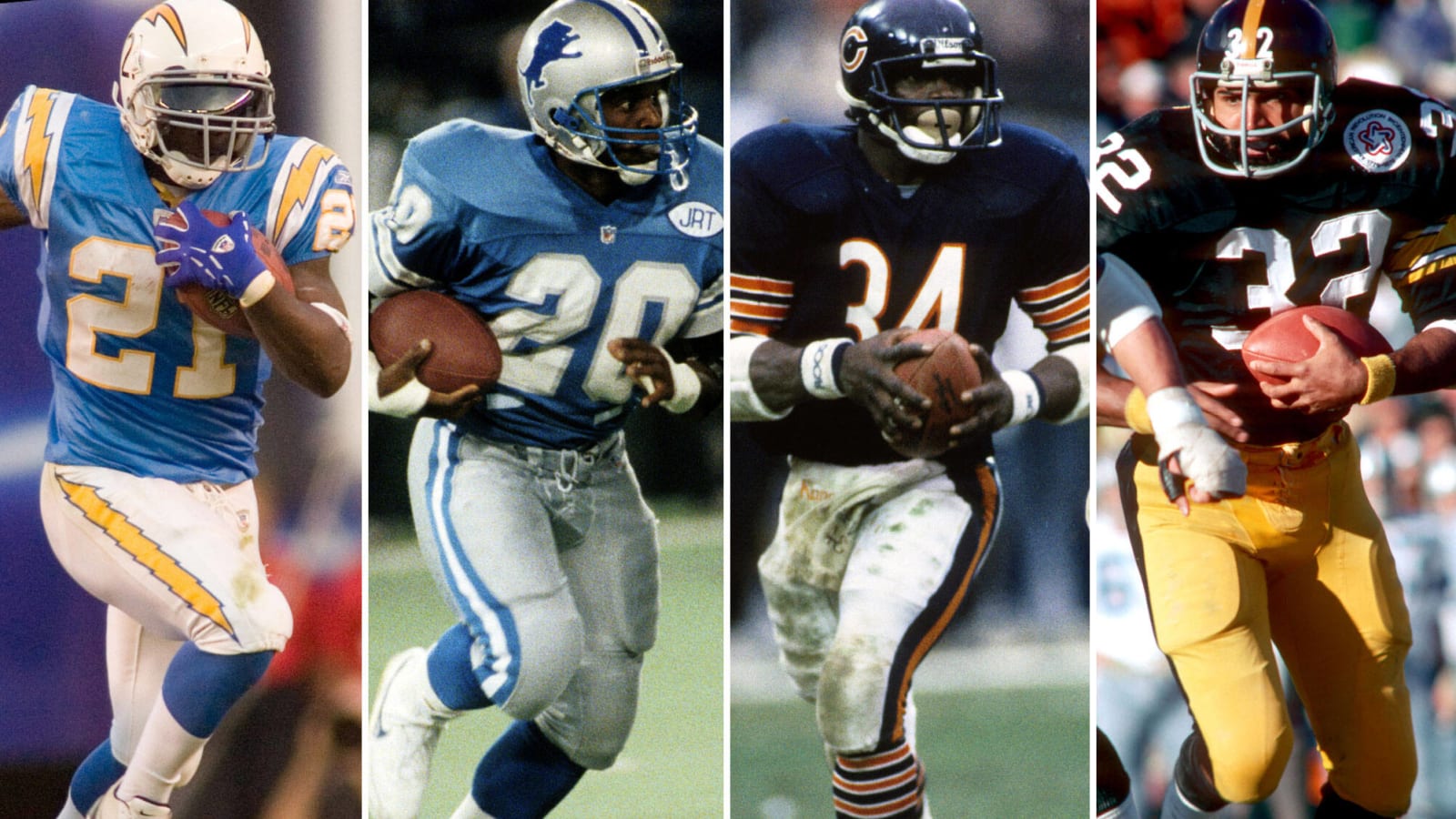
The greatest all-time running back from every NFL team
With running back value in a strange place, it feels like a good time to remind of the impact the greats made for their teams. Here is the best running back in each franchise's history.
Arizona Cardinals: Ollie Matson
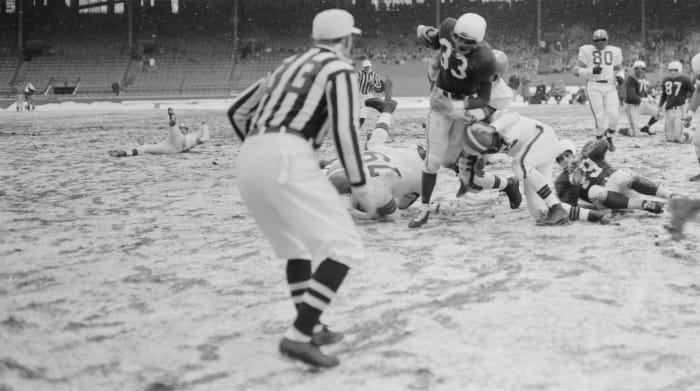
With the Cardinals title-less since their Chicago days, it makes sense Matson remains the franchise's RB kingpin. The former Olympic 400-meter bronze medalist stepped into the NFL as the No. 3 overall pick in 1952 and blazed to five straight All-Pro teams to start his career. In addition to the swift-footed back's rushing ability, he is one of the great return men in NFL history. Matson returned nine kicks or punts for touchdowns. The Cardinals were not a winning team by the time they drafted Matson and could not get over the hump with him, leading to the Rams sending nine assets for him in 1959. Matson played until 1966.
Atlanta Falcons: William Andrews

The former third-round pick's profile does not check in on the level of Jamal Anderson or Michael Turner, but his Falcons stretch tops both. The hard-charging runner zoomed to four 1,000-yard rushing seasons in five healthy years in Atlanta, with the 1982 players' strike likely preventing a fifth. Andrews, who twice surpassed 2,000 scrimmage yards, was also adept out of the backfield. He posted three 500-plus-yard receiving seasons, leading the NFL in scrimmage yards in 1981. After helping the Falcons to the 1980 NFC West title, Andrews was never the same after a severe knee injury sustained in a 1984 practice.
Baltimore Ravens: Jamal Lewis

The 2,000-yard club currently has eight members; Lewis was the fifth entrant, reaching that milestone in 2003. That performance helped the quarterback-deficient Ravens to the playoffs. But the powerful back did plenty more in Baltimore. The No. 5 overall pick in 2000, Lewis totaled 338 rushing yards during the Super Bowl-winning Ravens' four playoff games that year. He rebounded from a 2001 ACL tear by stringing together four more 1,000-yard rushing years with the team. As the Ravens struggled for QB competency, Lewis represented their offensive centerpiece. Lewis finished his career with three Browns seasons.
Buffalo Bills: O.J. Simpson

His reputation was irrevocably altered by the events of 1994, but Simpson still has the edge here. Thurman Thomas' 1991 MVP award notwithstanding, Simpson earned five straight first-team All-Pro honors in the 1970s. His 1973 season, which featured 2,003 rushing yards in 14 games, remains the post-merger standard at the position. "Juice" may have fared even better in 1975, when he amassed a career-high 2,243 scrimmage yards (also in the 14-game era) and an NFL-leading 23 TDs. The blazer out of USC led the league in rushing four times from 1972-76 and kept a high profile despite the Bills making the playoffs once in that span.
Carolina Panthers: DeAngelo Williams
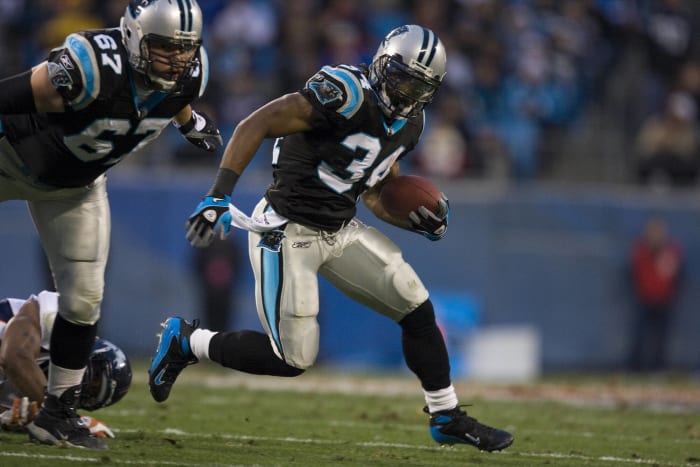
Christian McCaffrey is the most talented Panther back and responsible for the best RB season (2019) in team annals. Jonathan Stewart was the starter for Carolina's Super Bowl 50 team. But Williams operated as the Panthers' 1-A back during Stewart's prime. He still holds the franchise single-season rushing record (1,515 in 2008) and finished his nine-season Panthers run with a better yards-per-carry mark (4.8) than Stewart. Carolina paired Williams and Stewart throughout the former's career, and while no team would use back-to-back first-round picks on RBs today, Williams delivered as 2006's No. 27 choice, aiding both Jake Delhomme and Cam Newton.
Chicago Bears: Walter Payton

One of the few players who created a case to rival Jim Brown as the greatest ever, Payton may be the most tenacious back in football history. Missing just one career game, the 1975 No. 4 overall pick supplied elite vision and presented scary tackling missions for defenders for 13 years. Payton earned 1977 MVP honors, dragging a Bears team deficient just about everywhere else to the playoffs, and remained in top form into his 30s. That proved important, with Mike Ditka, Jim McMahon and a swarming defense in place to contend for Super Bowls by the mid-1980s. Payton earned his fifth first-team All-Pro nod at 32, helping the 1985 Bears to immortal status.
Cincinnati Bengals: James Brooks
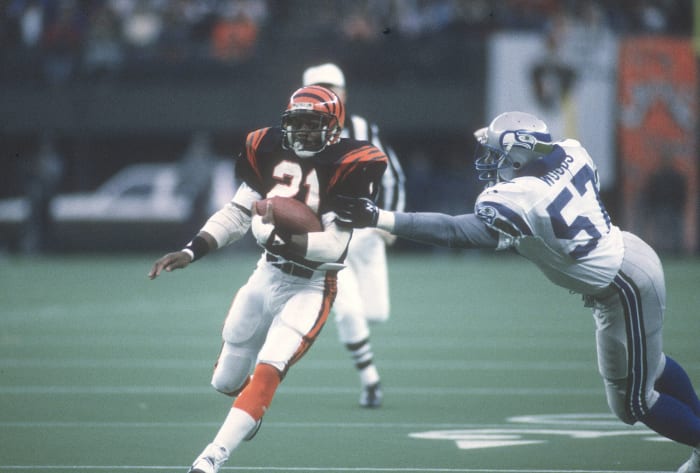
Corey Dillon's run of 1,000-yard rushing seasons only produced one finish in the top 10 in scrimmage yards. Brooks got there three times, providing Cincinnati with a weapon that would have been more appreciated today. Brooks' contributions during a period known for high-volume rushers went somewhat overlooked, as even a running back on his own team — known shuffler Ickey Woods — overshadowed him in the Bengals' best season. But Brooks soared to No. 3 and No. 5 in scrimmage yards (1986, '89). Those seasons remain underrated due to Cincy falling short of the playoffs, but the ex-Charger still finished with four Pro Bowls as a Bengal.
Cleveland Browns: Jim Brown

The gap between himself and his peers gives Brown the best claim among running backs as the greatest player ever. Brown played nine NFL seasons; he won eight rushing titles. The Browns' No. 6 overall pick in 1957 provided an ahead-of-his-time blend of size and speed, motoring to three MVP awards — no other non-QB has more than one — and helping the Browns to their most recent championship. Brown's best season came a year before that 1964 crown when he finished with 2,131 scrimmage yards in 14 games. A dispute with Art Modell from "The Dirty Dozen" set led to a 1966 retirement, but the longtime actor accomplished quite a bit in nine seasons.
Dallas Cowboys: Emmitt Smith
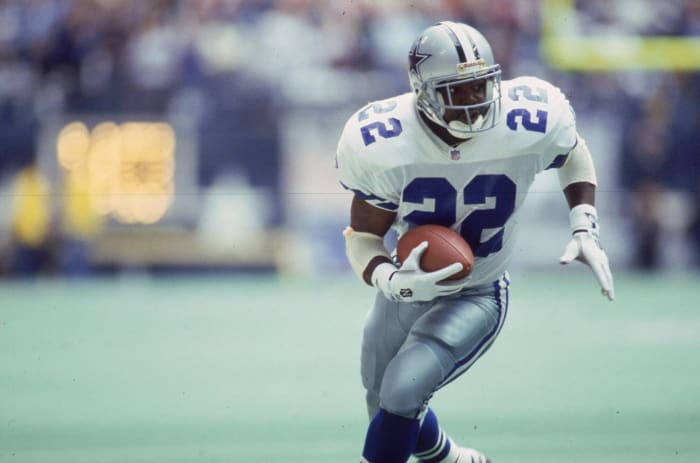
The Cowboys' stacked rosters during Smith's prime has brought frequent knocks against the game's rushing yards kingpin, and the 14-year veteran's peak indeed occurred behind some of the best offensive lines ever built. In particular, Smith was constantly compared to Lions change-of-direction maven Barry Sanders. But the 1990 first-rounder gave the Cowboys the full toolbox, and the all-around runner presented a strong display of RB value in 1993. After his two-game holdout had the Cowboys at 0-2, Smith won MVP honors — cemented by his finest hour, a 229-yard day in New York that clinched home-field advantage — and led Dallas to another title.
Denver Broncos: Terrell Davis

Davis possessed similar advantages to Smith, racking up three All-Pro honors behind an innovative blocking scheme that later produced a host of 1,000-yard rushers after Davis' 1999 knee injury. But he was by far the best of the Broncos' Mike Shanahan-era bunch and is the top playoff performer in RB history. Davis went 7-for-8 in 100-yard playoff games. No other back produced more than three such efforts. In addition to making the biggest difference in John Elway's late-career ring collecting, Davis is a 2,000-yard clubber who holds the single-season (regular and post) scrimmage yards record (2,762).
Detroit Lions: Barry Sanders
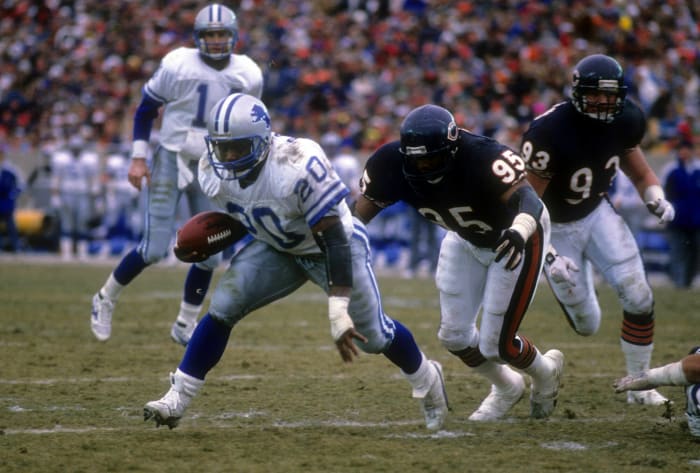
While the Matt Millen regime took heat for tanking the Lions, a line of demarcation formed when Sanders retired in 1999 as well; despite struggles to find a dependable QB throughout Sanders' career, the Lions journeyed to five playoff brackets between 1991 and '97. Sanders led the way each time, showcasing a not-since-replicated blend of speed and footwork. Sanders' stop-start routine involved several backward cuts, and he did not offer too much as a receiver. But only Jim Brown tops Sanders' four rushing titles and six first-team All-Pro accolades. Before retiring at 30, Sanders was cruising toward Payton's career rushing record.
Green Bay Packers: Jim Taylor
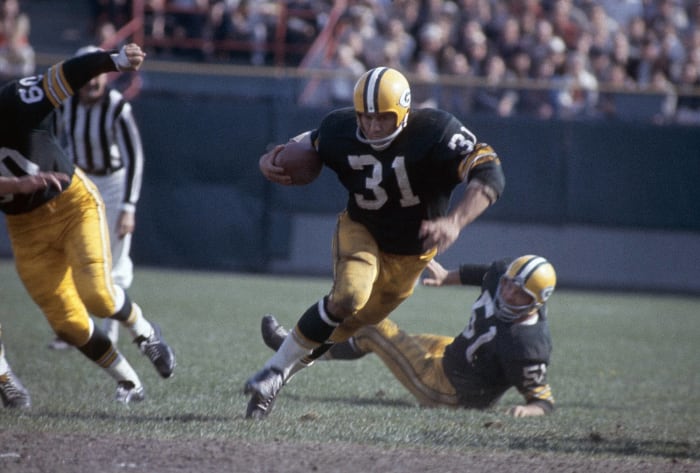
Billed a two-headed backfield during Vince Lombardi's heyday, a significant production gap exists between Taylor and halfback Paul Hornung. The rugged Packers fullback drove the team's vaunted ground attack, surpassing 1,000 yards five times and being the only non-Jim Brown rushing champ during the Cleveland legend's career. Taylor's 1,474-yard, 19-TD slate in 1962 powered the best team in Packer history. Taylor declining by the Super Bowl era and not being on the famed 1967 team led to some missed NFL Films screentime, but the five-time Pro Bowler represented a key reason for the team's Lombardi-era ascent.
Houston Texans: Arian Foster
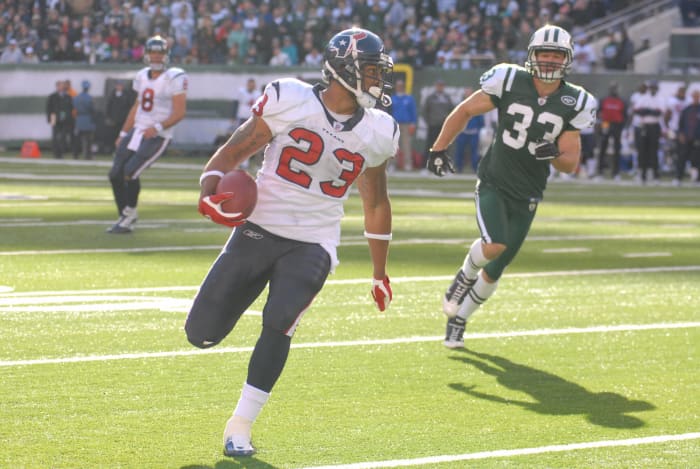
The young franchise has only employed one true backfield staple. No other Texans RB rivals Foster, who tacked three 1,000-yard seasons onto his stunning 2010 entrance. Reminding of Terrell Davis in Gary Kubiak's system, Foster's 2010 brought a rushing title (1,616 yards) and 18 touchdowns for the former undrafted free agent. Foster then led the league in TDs again in 2012, joining J.J. Watt and Andre Johnson in leading the 2012 Houston iteration to a 12-4 record and a second straight AFC South crown. Foster also returned from a 2013 back injury to top 1,200 rushing yards a year later.
Indianapolis Colts: Lenny Moore
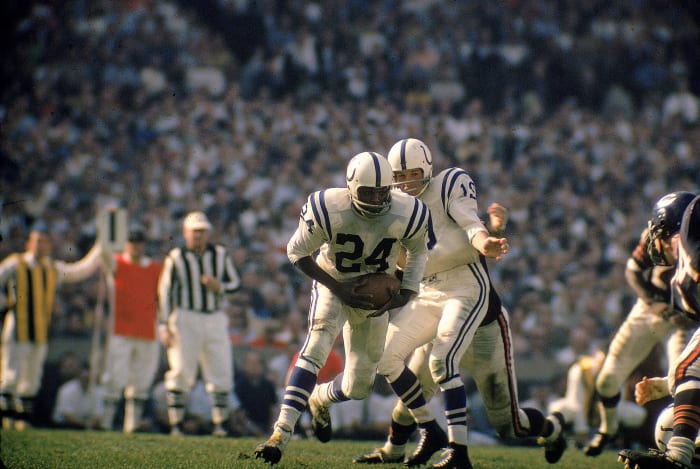
In terms of pure run-game skills, Edgerrin James eclipses the Johnny Unitas-era chess piece. But Moore contributed so much to the Colts' most successful period, spending the 1950s and '60s as an unparalleled dual threat. Stationed at receiver often, the five-time All-Pro led the NFL in yards per touch in each of his first six seasons. In his ninth (1964), the versatile Hall of Famer paced the league with 19 touchdowns. Moore arrived generations too early for earning-power purposes, as his skillset represents what teams seek in running backs. The 12-year Baltimore weapon finished his career with 113 TDs — eighth all-time among RBs.
Jacksonville Jaguars: Fred Taylor
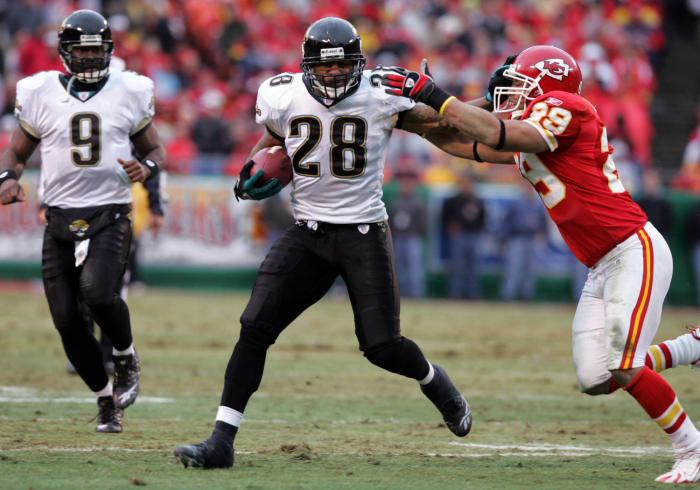
Maurice Jones-Drew won a rushing title, but Taylor was good for longer in Jacksonville. Taylor finished his 11-year Jaguars career with seven 1,000-yard seasons, helping the team transition from Mark Brunell to Byron Leftwich and then David Garrard. Never a touchdown compiler, Taylor only ventured to one Pro Bowl. That came at age 31 in 2007. While not a Hall of Fame-caliber player, the 1998 first-rounder should land in the Hall of Very Good at some point. He made important contributions to the Jags, teaming with Jimmy Smith to give the team running back and receiver linchpins during the late 1990s and early 2000s.
Kansas City Chiefs: Jamaal Charles

One of the more difficult calls on this list, the Chiefs' setup during their Charles years gives the speed merchant the edge on Priest Holmes. While Holmes ran behind a historically great offensive line, that group had splintered by the time Charles arrived as a 2008 third-round pick. Larry Johnson also ran behind Hall of Famers Willie Roaf and Will Shields during his brief prime, with Tony Gonzalez in place as well. No Canton-bound talents were left when Charles took over, but he still dashed to five 1,000-yard seasons — three of which after a 2011 ACL tear — and finished his Chiefs career with 5.5 yards per carry to place himself with the best all-time.
Las Vegas Raiders: Marcus Allen

Allen's career could have been much better. A bitter feud with Al Davis (and Bo Jackson's 1987 arrival) led to the five-time Pro Bowler spending part of his prime as a seldom-used cog. Allen logged fewer than 70 carries three times during his final four Raiders seasons, helping to keep him spry enough for a 16-year career that included a memorable Chiefs run. But Allen's best stuff came in Los Angeles. His Super Bowl XVIII run will live on as long as football does, and the smooth runner/receiver stood as the QB-limited Raiders' top option by the mid-'80s. Allen's 1985 MVP season powered L.A. to the AFC's No. 1 seed despite Marc Wilson starting 13 games at QB.
Los Angeles Chargers: LaDainian Tomlinson
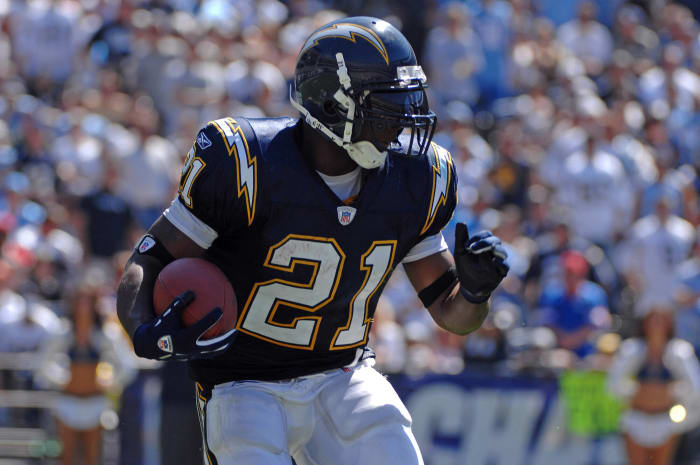
Gen X and Millennial fantasy GMs long for the days of the bell-cow back. Tomlinson delivered annually for the Chargers and his millions of fake teams, creating a Hall of Fame resume and being one of the lead drivers behind the now-ubiquitous online pastime's explosion. The 2001 first-rounder made regular aerial contributions, helping Drew Brees develop, and teamed with Antonio Gates to lead the Bolts to four consecutive AFC West titles. The bruising back's 31 touchdowns from 2006 remain three ahead of the next-best offering, and he managed 153 TDs in nine Charger seasons. Even Tomlinson's San Diego TD total would sit sixth in NFL history.
Los Angeles Rams: Eric Dickerson

Dickerson did not offer Marshall Faulk's versatility, but the elder Hall of Famer's Rams run was better. Dickerson's graceful style lives on today, with his 2,105-yard 1984 season continuing to stand as the all-time best. Beyond the storied sophomore-season number, Dickerson led the NFL in rushing in three of his four full Rams seasons. With L.A. struggling to staff its QB position during that period, Dickerson did the most to make the team a near-annual contender. Dickerson's 248 rushing yards in a 1985 wild-card trouncing of the Cowboys — after his lone non-All-Pro Rams slate — remains far and away the playoff standard as well.
Miami Dolphins: Larry Csonka

The Dolphins trotted out Jim Kiick and Mercury Morris as their halfbacks during an early-1970s dynasty, but Csonka was the constant. Miami's fullback set the tone for Don Shula's ruthless ground forces, with his three 1,000-yard years ending with back-to-back-to-back Super Bowl appearances. Miami's grinder put the Vikings to sleep with an MVP performance in Super Bowl VIII, enabling the Dolphins to stampede to victory over a strong defense as Bob Griese threw seven passes. Csonka's Dolphins prime ended early, due to the World Football League dollars luring him away in 1975, but no Miami back has meant more to the team since.
Minnesota Vikings: Adrian Peterson
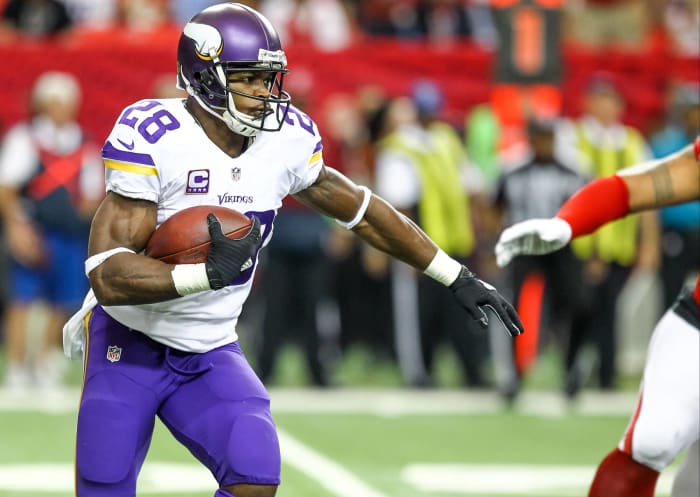
Thus far, Peterson is this era's only first-ballot Hall of Fame lock at running back. Whereas Frank Gore's climb to No. 3 all time was more about durability, Peterson has the single-season numbers to support his claim as the post-LaDainian period's premier back. Eight of Peterson's nine 1,000-yard seasons came in Minnesota, and he won two of his three rushing titles (2008, 2015) eight years apart. "All Day" will be best remembered for his second rushing crown, of course, when he recovered from a 2011 ACL tear to come closest to Dickerson's record. Peterson's 2,097 yards made him the most recent non-QB MVP.
New England Patriots: Jim Nance

The Bill Belichick era has brought some solid running back seasons — from Corey Dillon and LeGarrette Blount, to name two — but this Patriots regime has not prioritized its between-the-tackles runners in the form of long-term deals. As such, Nance's AFL work earns this spot. The Pats power back collected AFL Player of the Year acclaim in 1966, and he added another AFL rushing title a year later. All-time Pats rushing leader Sam Cunningham has a slight longevity edge, and the fullback was part of a historic team backfield showing in 1978. But back-to-back rushing crowns are tough to beat here.
New Orleans Saints: Alvin Kamara

This period's top multipurpose back has passed the likes of George Rogers and Deuce McAllister in Saints history, going from third-round pick to vital cog in the team's late-Drew Brees machine. Quickly becoming the A-side in the Kamara-Mark Ingram tandem, the Tennessee alum finished with at least 81 catches in his first four seasons (exactly 81 from 2017-19) and helped the Saints to NFC South titles in each year. Wounding the "RBs don't matter" case with his versatility, Kamara staying healthy in 2021 probably would have dragged New Orleans to another playoff berth after Brees' retirement. Kamara has carved out a nice legacy for a player without a 1,000-yard rushing season.
New York Giants: Frank Gifford

Talent-wise, Saquon Barkley would have the edge. Tiki Barber also delivered better rushing work. But Gifford offered a rushing-receiving skillset during a high point in Giants history. Numbers give Barber an easy decision here, but the scorecards point to Gifford for impact. In a smaller NFL universe, yes, Gifford earned four first-team All-Pro honors and claimed MVP in a 1956 season that ended with a Giants championship rout of the Bears. Gifford caught four passes for 131 yards in that romp, providing a prelude of his late-career receiver work — which transpired after a Chuck Bednarik hit put him out of football for a season.
New York Jets: Curtis Martin

Striking another blow for the position's cause, Martin delivered his best work after a fourth-year relocation to New York. The former Patriots draftee rejoined Bill Parcells via a restricted free agent offer sheet — yes, it is unrealistic for a team to part with first- and third-round picks for a back today; it wasn't then — and shaped a Hall of Fame career from Year 4 through Year 10. Martin rushed for 1,000 yards in each of his first seven Jets seasons and played a central role in the team voyaging to four playoff brackets in that span. Martin won his only rushing title at 31, boosting the 2004 Jets to the divisional round.
Philadelphia Eagles: Steve Van Buren

For impact and standing among contemporaries, LeSean McCoy and Wilbert Montgomery do not come particularly close to Van Buren. "Supersonic Steve" won four rushing titles in an eight-year career, the last of which — in 1949 — featuring 1,149 yards (second all time at that point) in 12 games and preceding one of the great single-game outings in RB history. Van Buren mowed down the Rams, totaling 196 rushing yards — a championship record for nearly 40 years — to lead the Eagles to their second straight NFL crown. Finishing his career with five first-team All-Pro distinctions, Van Buren made the biggest impact during the Eagles' zenith.
Pittsburgh Steelers: Franco Harris

As Terry Bradshaw took years to develop into a high-end passer, the Steelers offense ran through Harris as dynastic ingredients formed. The 1972 first-round pick, known for a catching a rather memorable deflection in the game after Offensive Rookie of the Year votes were tabulated, continued as a rock for Pittsburgh during Bradshaw's ascent. Harris' inside running produced nine Pro Bowls in his first nine seasons, and he was still in good form by the time the Steelers won their fourth Super Bowl in 1979. Even as the Steelers offense could trust its passing dimension more as the 1970s progressed, it had a ruthlessly consistent ground option on which to rely.
San Francisco 49ers: Frank Gore

Gore's highest peaks trailed the likes of Joe Perry and Roger Craig; even Garrison Hearst's best 49ers year was arguably better. But Gore kept delivering upper-echelon production throughout his 10-year San Francisco stay. This volume will lift Gore, No. 3 on the all-time rushing list, into Canton, even if only one All-Pro nod — a 2006 second-team effort — appears on his resume. For a team that never had a true franchise QB when he was there, Gore gave the 49ers a dependable ground option. The 2005 third-rounder racked up eight 1,000-yard years as a 49er and was the skill-position constant for Jim Harbaugh's early-2010s string of contenders.
Seattle Seahawks: Marshawn Lynch
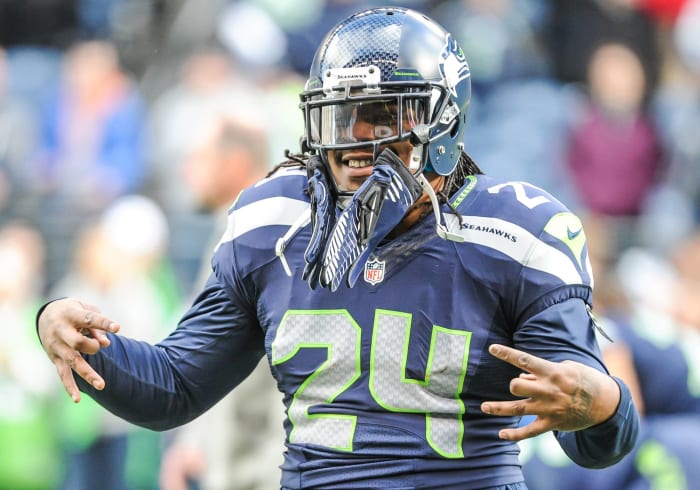
Shaun Alexander soared a bit higher in Seattle, but he and Lynch's prime durations are similar. And Alexander enjoyed the opportunity to run behind Hall of Famers Walter Jones and Steve Hutchinson. Lynch showed the value of a modern running back by forming an elite QB-RB duo with Russell Wilson, as OC Darrell Bevell crafted a zone-read-based scheme that unleashed the relentless back. Lynch rebounded after a 2010 trade to Seattle, posting four 1,000-yard seasons to help the team to two Super Bowls during a run that should have brought two titles. If Alexander-Lynch came down to a tossup, "Beastquake" would be our tiebreaker.
Tampa Bay Buccaneers: Mike Alstott

The last of the fullback icons to come through the NFL, Alstott made his name as a vicious tackling assignment rather than a true lead blocker. The Buccaneers' Warrick Dunn tandem partner provided a more unique highlight reel compared to the productive halfback, steamrolling to six consecutive Pro Bowls during the top stretch in team history (1997-2002). Alstott even managed to add 11 receiving touchdowns during his 11-year career. Dunn having spent three years in Atlanta and James Wilder not sustaining his apex long enough cleared the runway for Alstott, who rarely needed clear paths to do damage.
Tennessee Titans/Houston Oilers: Earl Campbell

Derrick Henry's ascent aside, it is too difficult to move past the fear Campbell instilled in tacklers during his prime. The former Texas Heisman winner began his career with three consecutive rushing titles, going from Offensive Rookie of the Year to MVP to a career-high 1,934 yards over his first three seasons. Campbell drove the Oilers to three playoff berths in that span, and the 1982 strike season likely prevented him from six straight 1,300-yard years to begin his career. Not much of an outlet option in the passing game, Campbell offered so much on the ground — for a team without a top-shelf QB — it did not detract much from his greatness.
Washington: John Riggins

Riggins' 1982 postseason ranks up there as the most impactful in the sport's history. The powerful 12th-year veteran accumulated 610 rushing yards in Washington's four playoff games. The rare running back to peak after 30, Riggins followed that up with a 24-touchdown season at age 34. "The Diesel" provided the defining play — a 43-yard TD run on fourth-and-1 — in Super Bowl XVII, Washington's first Super Bowl title, and was still in top form by his age-35 season, when he led the NFL with 14 rushing TDs. The ex-Jet offered his second NFL team tremendous value at ages when backs are often shopworn.
Sam Robinson is a Kansas City, Mo.-based writer who mostly writes about the NFL. He has covered sports for nearly 10 years. Boxing, the Royals and Pandora stations featuring female rock protagonists are some of his go-tos. Occasionally interesting tweets @SRobinson25.
More must-reads:
- Veteran WR announces retirement from NFL
- Steelers agree to deal with veteran CB
- The 'NFL MVP runners-up' quiz
Breaking News
Customize Your Newsletter
 +
+
Get the latest news and rumors, customized to your favorite sports and teams. Emailed daily. Always free!
Use of this website (including any and all parts and
components) constitutes your acceptance of these
Terms of Service and Privacy Policy.

